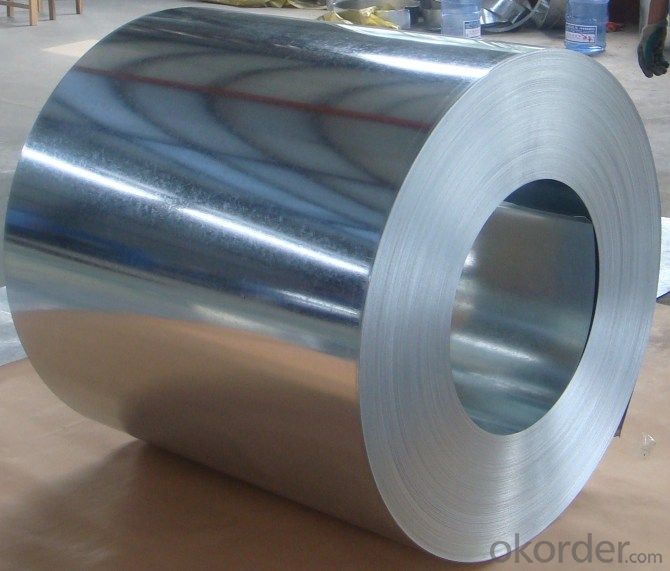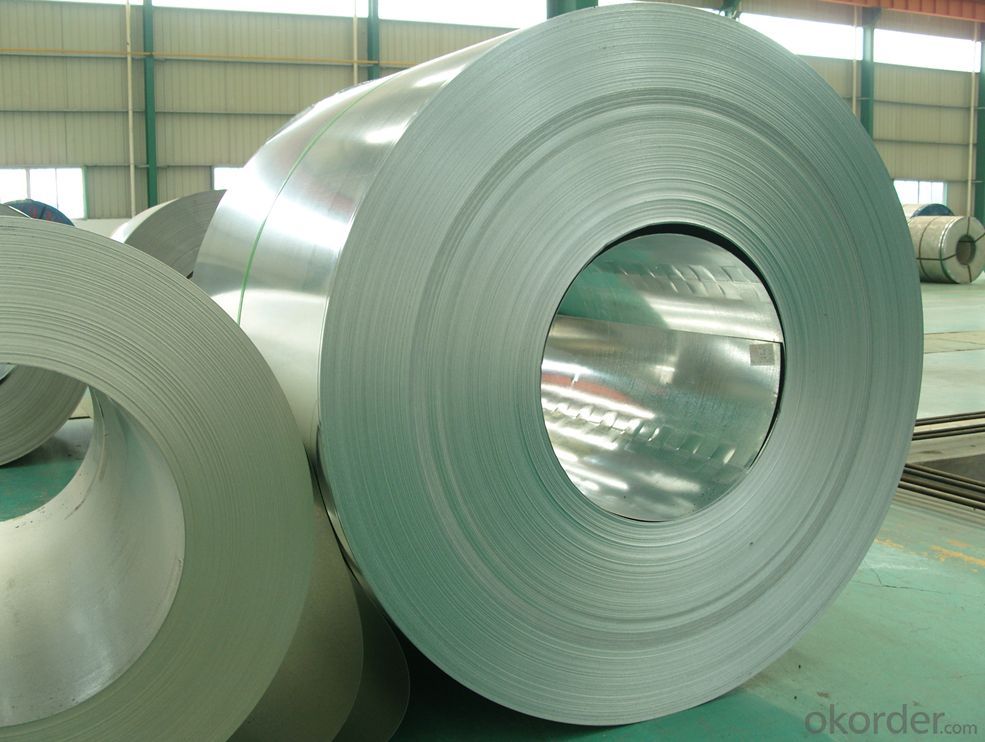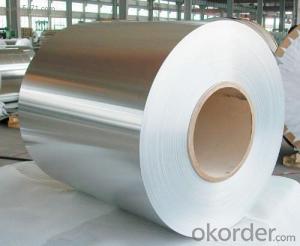Hot-dip Zinc Coating Steel Building Roof Walls DX51D+Z
- Loading Port:
- China main port
- Payment Terms:
- TT OR LC
- Min Order Qty:
- 50 m.t.
- Supply Capability:
- 10000 m.t./month
OKorder Service Pledge
OKorder Financial Service
You Might Also Like
Hot-dip Zinc Coating Steel Building Roof Walls DX51D+Z
1.Structure of Hot-dip Zinc Coating Steel Building Roof Walls DX51D+Z :
Hot-dip galvanized steel coils are available with a pure zinc coating through the hot-dip galvanizing process. It offers the economy, strength and formability of steel combined with the corrosion resistance of zinc. The hot-dip process is the process by which steel gets coated in layers of zinc to protect against rust. It is especially useful for countless outdoor and industrial applications. Production of cold formed corrugated sheets and profiles for roofing, cladding, decking, tiles, sandwich walls, rainwater protective systems, air conditioning duct as well as electrical appliances and engineering.
2.Main Features of Steel Sheet:
• Excellent process capability
• Smooth and flat surface
• Workability, durability
• Excellent anticorrosive property
3.Hot-Dip Galvanized Steel Sheet Images:


4.Hot-Dip Galvanized Steel Sheet Specification
Standard: ASTM, JIS,EN
Grade: CS, DX51D+Z,SGCC, SS 230~550,S220GD+Z~S550GD+Z, SGC340~SGC570
Thickness: 0.18mm~5mm
Width: max 2000mm
Coil weight:3-12 MT
Coil ID:508/610mm
Surface structure: zero spangle, regular spangle or minimum spangle
Surface treatment: Chromate treatment, Oiled/dry, skinpassed/non-skinpassed
5.FAQ of Hot-Dip Galvanized Steel Sheet
We have organized several common questions for our clients,may help you sincerely:
1.How to guarantee the quality of the products?
We have established the international advanced quality management system,every link from raw material to final product we have strict quality test.
2. How long can we receive the product after purchase?
Usually within thirty working days after receiving buyer’s advance payment or LC. We will arrange the factory manufacturing as soon as possible. The cargo readiness usually takes 15-30 days, but the shipment will depend on the vessel situation.
- Q:How are steel coils loaded onto a truck?
- Loading steel coils onto a truck is typically accomplished by combining machinery and manual labor. To ensure safe and efficient loading, several steps are involved. To begin, the truck must be adequately prepared. This entails cleaning the truck's bed and removing any debris or obstacles that could hinder the loading process. Additionally, protective materials like rubber mats may be placed on the truck's bed to safeguard both the coils and the truck. Next, a forklift or crane is utilized to lift and position the steel coils onto the truck. The operator must handle the coils with care, ensuring they are balanced and securely fastened to prevent movement during transportation. Adhering to proper lifting techniques and safety protocols is critical to avoid accidents or coil damage. After the coils are positioned on the truck, various methods can be employed to secure them. This may involve using straps, chains, or other restraints to hold the coils in place and prevent shifting or falling while in transit. The restraints must be appropriately tightened and inspected to withstand the weight and movement of the coils. It is worth noting that the loading process may vary based on the size and weight of the steel coils, as well as the available equipment. Some trucks may feature specialized loading systems specifically designed for steel coils, streamlining the process and enhancing safety. In summary, loading steel coils onto a truck necessitates meticulous planning, skilled operators, and suitable equipment. Adhering to proper procedures and safety measures is vital to ensure successful coil transportation and prevent accidents or damage.
- Q:What are the common coil surface treatments available for steel coils?
- The common coil surface treatments available for steel coils include galvanizing, galvannealing, electro-galvanizing, and painting.
- Q:What are the common tests performed on steel coils for quality assurance?
- Steel coils undergo various tests to ensure their quality and compliance with industry standards and customer needs. Dimensional inspection is a prevalent test that measures the length, width, and thickness of the coils to verify their specified dimensions. Any deviations in dimensions can indicate potential quality issues. A thorough visual inspection is also conducted to identify defects and surface imperfections like scratches, dents, or rust. This examination is crucial to identify any visual flaws that may affect the coils' performance or appearance. Furthermore, mechanical tests are carried out to assess the strength and durability of the steel coils. Tensile tests measure the maximum force the steel can withstand before breaking, determining its tensile strength, yield strength, and elongation properties. Another commonly performed mechanical test is the hardness test, which determines the steel's resistance to indentation, indicating its strength and toughness. These tests are typically conducted using methods like Rockwell, Brinell, or Vickers. Corrosion resistance is also evaluated as a vital aspect of steel coil quality. Tests such as salt spray or humidity tests simulate harsh environmental conditions to assess the steel's ability to resist corrosion. Lastly, chemical composition analysis is performed to ensure that the steel coils contain the necessary elements in the correct proportions. This analysis verifies that the steel meets the required chemical properties, which significantly impact its performance and suitability for specific applications. In summary, these common quality assurance tests guarantee that steel coils meet industry standards, customer requirements, and are suitable for their intended use.
- Q:Can steel coils be customized in terms of size and specifications?
- Yes, steel coils can be customized in terms of size and specifications. Steel coils are typically manufactured in standard sizes and specifications, but they can be customized to meet specific requirements based on the needs of the customer. Customization can involve adjusting the dimensions of the coils to different widths, lengths, and thicknesses, as well as modifying the specifications such as the type of steel, surface finish, and coating. This allows steel coils to be tailored to various applications and industries, ensuring they meet the specific requirements and performance criteria of the customers. Customized steel coils are commonly used in industries such as automotive, construction, manufacturing, and appliances, where specific sizes and specifications are crucial for efficient and effective operations.
- Q:I heard about a new bike the specialized allez steel. Has anyone heard anything about it. it will have all brand new components like shimano 2300 parts and everything. it looks nice.
- Steel? I doubt it's made out of steel, more labor and a heavier frame. Most likely aluminum. Shimano 2300 you say? The Shimano 2300 is the lowest of the low of Shimano road components. Most likely not too reliable and heavy. www.cyclestore .uk/productDetai... I think this is what you might be looking for.
- Q:Hi, I live in the Boston area and I'm trying to find a steel suppler that can provide mild steel for hobby welding. I can go through my job, but we only put in orders every couple of months so it's not very convenient. Also, the few suppliers I've found only sell in bulk. So if anyone knows where I can angle irons, flat bars, sheets, etc... by the piece it would greatly appreciated. Thanks
- They will sell any quantity of metal and even cut it to size - my experience has been that their prices are not wildly out of line for single pieces of full length stock compared to buying singles where you have to buy a minimum. They also may have sizes that ordinary places consider odd. I was looking for 5/8 square 16 gauge and was told it would have to be shipped in from Houston (to Dallas) by my nearest supplier and found it in stock at MetalSM. But check if you get something odd - the 5/8 cost more than 3/4 at both places and MetalSM actually gave me 3/4 but took it back even though I had cut it. Also check the regular steel suppliers in your area as well as retail welders metal supply places.
- Q:What are the dimensions of steel coils used in the transportation equipment industry?
- The dimensions of steel coils utilized in the transportation equipment sector may differ according to specific demands and applications. Nevertheless, there exist some prevalent measurements that are extensively employed. Typically, the width of steel coils used in the transportation equipment industry ranges from 600mm to 2000mm (24 to 78 inches). This width is selected to ensure compatibility with the machinery and equipment employed in transportation, such as trucks, trailers, and railcars. The thickness of steel coils exhibits significant variation depending on the specific application and desired material strength. However, common thickness ranges for steel coils in the transportation equipment industry generally fall between 0.5mm and 6mm (0.02 to 0.24 inches). The inner diameter of steel coils utilized in the transportation equipment industry is typically standardized at either 508mm (20 inches) or 610mm (24 inches). This standardization facilitates easy handling and compatibility with industry machinery. The outer diameter of steel coils can differ depending on the coil's width and thickness. Nonetheless, typical outer diameter ranges for steel coils in the transportation equipment industry generally span from 1000mm to 2200mm (39 to 87 inches). It should be recognized that these dimensions are not fixed and can be tailored to specific requirements and applications within the transportation equipment industry.
- Q:Are steel buildings more durable than concrete building?
- Not necessarily as most concrete buildings are steel re-inforced anyway. As for durable, if talking time based, no, because steel will corrode and concrete will not. The good thing about concrete is that it has good load bearing capability over wide spans whereas steel will bend unless properly supported. Concrete is cheaper also....
- Q:Is boron steel or carbon steel a harder metal? Which one is more flexible?
- The only thing that affects the hardness of steel is the carbon content. But there are many elements that can make it easier for a steel to achieve its maximum hardness. And Boron is an extremely effective element that increases the hardenability of steel. Adding as little as 0.002% Boron can have a big impact upon quenching of a steel. Boron is usually added when you need the hardness of a heat treated steel part to extend deep below the surface. For example, lets say you had a two identical plain carbon steel parts, but one had boron and the other didnt, and you wanted to heat treat them both After quenching, the surface should be the same on both, and lets say its 55 Rockwell C. In the plain carbon one, the hardness might drop down to 50 at 2mm under the surface, but the boron treated one might not drop to 50 until 4mm under the surface. Now, these numbers were completely made up, and it would depend on the specifics as to what the difference might be.
- Q:How do steel coils contribute to sustainability in construction?
- Several factors contribute to the sustainability of construction when it comes to steel coils. To begin with, steel is an incredibly durable material with a long lifespan. Its use in the construction of structural components like beams, columns, and frames ensures the stability and strength of buildings. This durability translates to reduced maintenance requirements and a longer service life for structures. As a result, the need for frequent repairs or replacements is diminished, leading to a decrease in the overall environmental impact associated with material waste and energy consumption. Moreover, steel is highly recyclable. Steel coils can be easily recycled and reused in new construction projects. The recycling process for steel has a significantly lower environmental impact compared to the production of new steel. By incorporating recycled steel coils into construction projects, the demand for new steel production is reduced, resulting in lower greenhouse gas emissions and a smaller carbon footprint. This approach helps conserve natural resources, reduces the extraction of raw materials, and minimizes energy consumption in steel production. Additionally, steel is an ideal material for off-site prefabrication. This means that steel coils can be manufactured in controlled environments in factories, minimizing construction waste and improving construction efficiency. Prefabricating steel coils reduces on-site material waste and decreases the need for transportation of construction materials. Consequently, this reduces air pollution and energy consumption during construction. Furthermore, steel's high strength-to-weight ratio allows for lighter and more efficient structures. By using steel coils, construction projects can optimize material usage, resulting in reduced material consumption and lessening the overall environmental impact. The lightweight nature of steel coils also facilitates easier transportation, reducing fuel consumption and associated emissions during delivery. In summary, steel coils contribute to the sustainability of construction through their durability, recyclability, prefabrication capabilities, and high strength-to-weight ratio. By utilizing steel coils, construction projects can minimize waste, conserve resources, reduce energy consumption, and decrease the environmental impact, ultimately promoting a more sustainable built environment.
1. Manufacturer Overview |
|
|---|---|
| Location | |
| Year Established | |
| Annual Output Value | |
| Main Markets | |
| Company Certifications | |
2. Manufacturer Certificates |
|
|---|---|
| a) Certification Name | |
| Range | |
| Reference | |
| Validity Period | |
3. Manufacturer Capability |
|
|---|---|
| a)Trade Capacity | |
| Nearest Port | |
| Export Percentage | |
| No.of Employees in Trade Department | |
| Language Spoken: | |
| b)Factory Information | |
| Factory Size: | |
| No. of Production Lines | |
| Contract Manufacturing | |
| Product Price Range | |
Send your message to us
Hot-dip Zinc Coating Steel Building Roof Walls DX51D+Z
- Loading Port:
- China main port
- Payment Terms:
- TT OR LC
- Min Order Qty:
- 50 m.t.
- Supply Capability:
- 10000 m.t./month
OKorder Service Pledge
OKorder Financial Service
Similar products
New products
Hot products
Related keywords





























